Will Beach Camping Ruin Your RV or Vehicle?
Whether you’re building sandcastles, fishing, or just working on your tan, the beach is a great place to spend a weekend. However, if you do it wrong, you could risk not only ruining your trip but also damage to your RV.
From getting stuck in the sand to salt and wind damage, we talk about the possible issues and how you can prevent them.
Let’s see if beach camping is for you!
What Beach Camping Hazards Can Ruin Your RV?
While it may provide incredible views, there are a few things you should be aware of before beach camping. Let’s take a look!
Getting Stuck on the Beach
Anytime you tow or park your RV on soft surfaces, there’s a risk that your RV gets stuck. If you’re not able to get out, you’re going to need a fellow camper or a tow truck to get you out of the sand.
To minimize the risk of a stuck RV, make sure to carry the appropriate materials (a shovel, MaxTrax, and even a bucket for water). Having access to the appropriate tools can give you a fighting chance before calling a tow company.

Exterior Damage to Your RV or Vehicle
Beach camping means exposing the exterior of your RV or vehicle to some pretty harsh environments. When you visit a saltwater beach, you can smell the salt in the air. The same salt you’re smelling is also coating the exterior of your RV and vehicle. Critical components of your RV and vehicle can quickly rust due to exposure to salt.
The same sand that you find so appealing can also be harmful to your RV and vehicle. Sand crystals are incredibly small and can lodge themselves in the tiniest of places. Make sure you don’t wait too long before running your RV and vehicle through a car wash at the end of your trip to get the salt and sand off your RV and vehicle.
While your solar panels will soak up all that sun, prolonged sun exposure can damage your decals and roof over time. If the heat from the sun is particularly intense, this can also cause issues for the seals around your RV’s windows and doors.
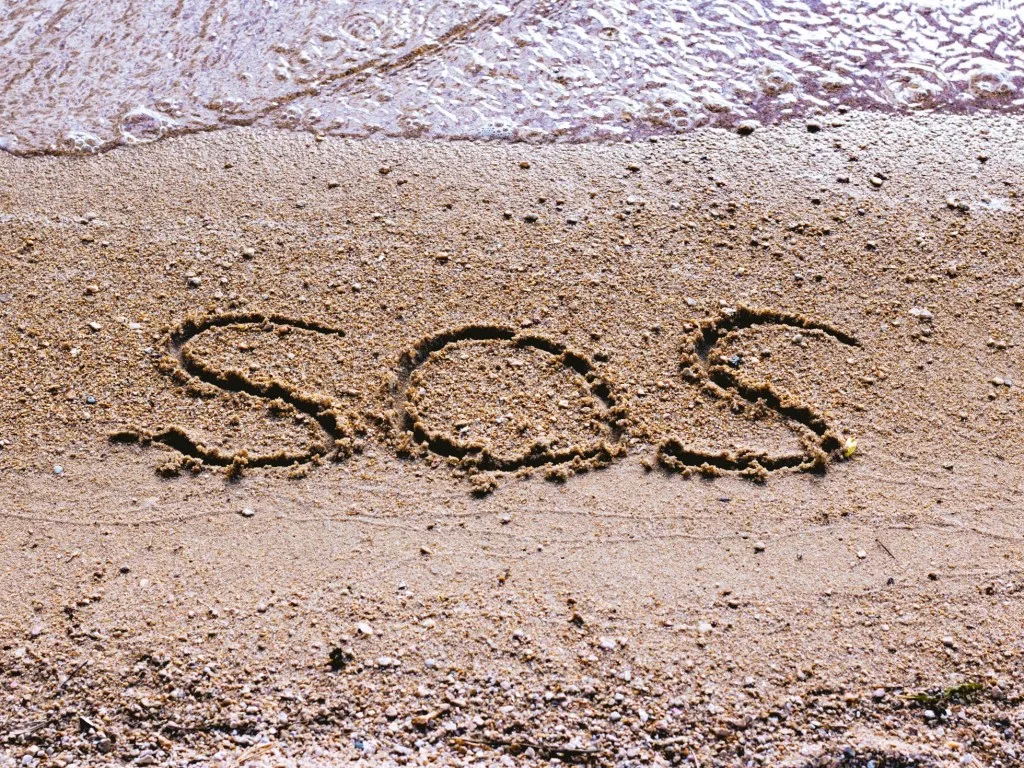
Water Damage
You want to camp close to the water, but not too close, as water damage in an RV can be devastating. Water entering your RV through the roof is challenging to dry out fully. Trapped moisture can lead to mold. Mold in an RV can be hazardous and requires your immediate attention.
The materials used in RVs are often strategically light and cheap. These lower-quality materials make them incredibly susceptible to damage when exposed to water.
Major water damage in an RV, in the best-case scenario, typically involves ripping out walls and, in the worst-case scenario, will result in a catastrophic loss of your RV.
Wind Damage
When you’re setting up for some beach camping, you’re out in the open. Being out in the open means there’s little, if anything, blocking you from the wind. A sudden gust of wind can very quickly destroy awnings but also cause camping gear to blow away or into your RV.
If you plan to spend time beach camping, make sure to keep an eye on the wind and secure any items that could blow away.
How to Avoid Getting Your RV Stuck on the Beach
Before you pack up your beach camping gear, let’s look at a few things you can do to avoid getting stuck in the sand.
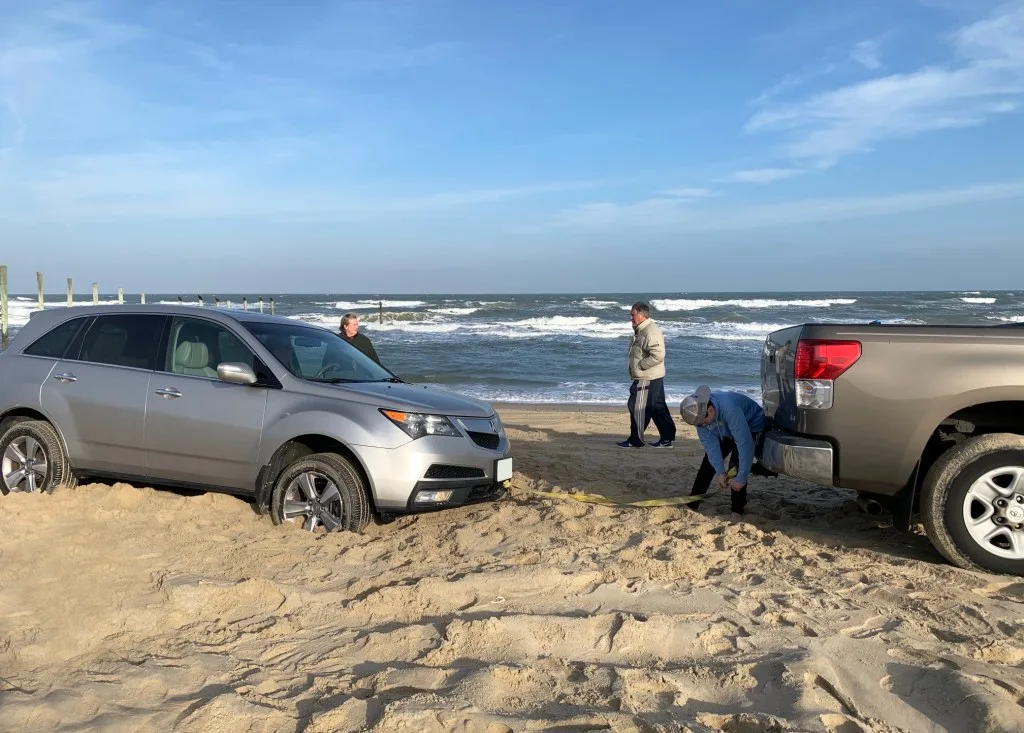
Know Where to Drive Your RV
Driving your RV through a dune may seem exciting and adventurous, but you could end up stuck. Knowing where you should and shouldn’t drive your RV can avert a disaster. You don’t want to start or end your trip with a stuck RV.
If you’re unfamiliar with the area, take the time to do your research. Read reviews from previous campers and even look at an aerial map to develop a plan for entering and exiting your beach camping spot, so you don’t ruin your RV. You may even phone ahead and speak to a ranger to see if they have any advice. The park rangers don’t want your RV stuck in deep ruts any more than you do.
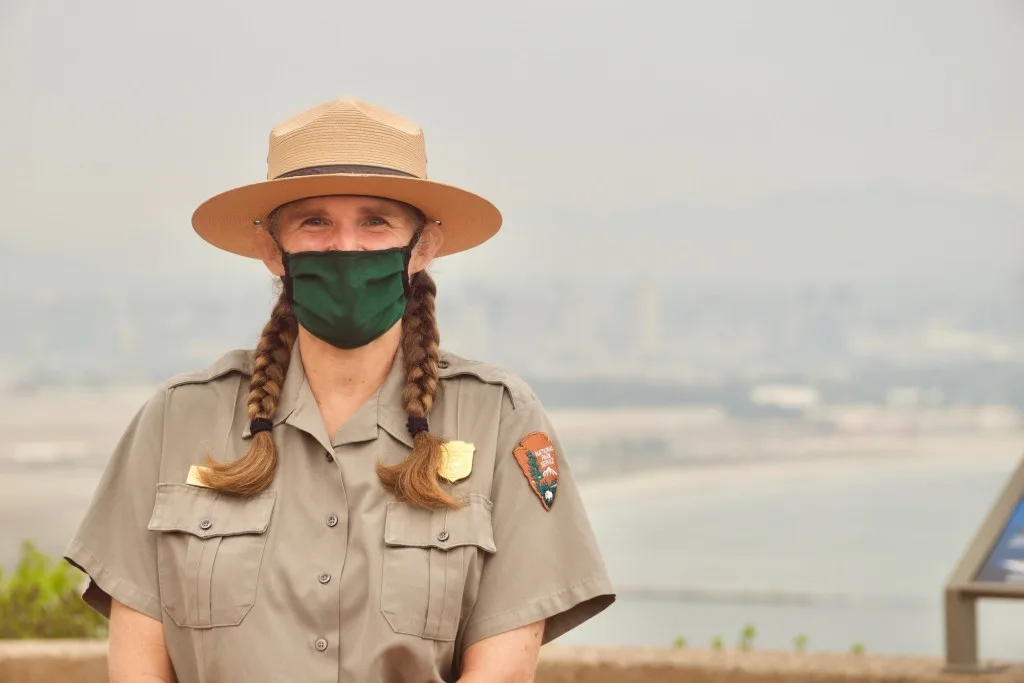
Keep in Mind: Size does matter and can impact where you can or cannot drive your RV! Researching routes and contacting park rangers before you travel can help give you peace of mind. Read more about why you shouldn’t assume your RV can fit everywhere.
Don’t Park on Wet Sand
It may be tempting to see the packed wet sand as a great spot to park. It’s easy to walk and drive on, but it’s a disaster waiting to happen. The tide reached that area at some point and left the sand wet. High tides always come back. No matter how incredible the view, you’re likely to wake up surrounded by water.
The once-packed sand will quickly turn soft, and your RV’s weight will cause it to sink deep down into the sand. If you can’t exit the area in time, you could have sand up to the frame when the water recedes to low tide. No matter how powerful a tow vehicle you have, you’ll likely need to call for professional assistance.
Take note of low and high tides. You don’t want to find yourself packing up frantically because you didn’t park far enough away from the water.
Bring Supplies
Always arrive prepared. Acquiring and bringing the proper supplies with you is essential to surviving a weekend of beach camping. Items like plywood, MaxTrax, and even a foldable shovel can be a huge help in avoiding getting your RV stuck in the sand.
How to Protect Your RV from Sand, Salt, and UV Rays
If you plan to beach camp regularly, there are a few things you should do to keep your RV protected. Let’s take a quick look!
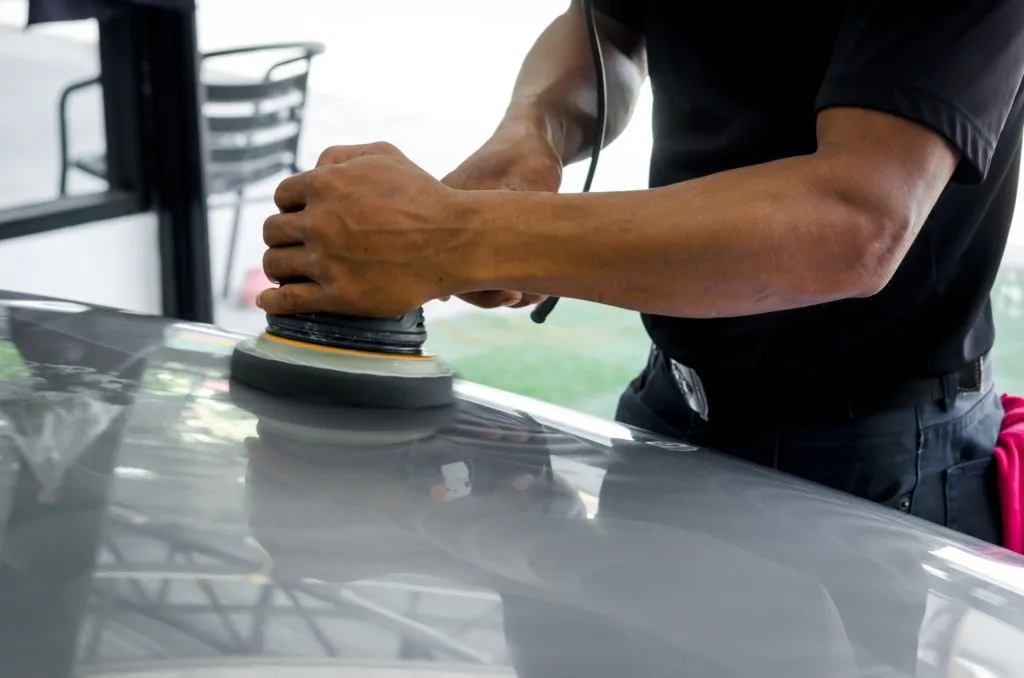
Wash and Wax Your RV
When you leave your beach camping location, wash and wax your RV. This will help get the sand and salt off of the exterior. It’s crucial that you not just focus on the sides but also the top and undercarriage.
Prolonged exposure to salt and grime found at the beach can quickly deteriorate the essential components of your RV. Even the hardest to reach and see components require your attention.
How to Prevent Water Damage from Ruining Your RV
Beach camping is a popular summer activity because everyone wants to be near the water. However, if you’re too close to the water, you can quickly find yourself underwater with your RV.
Watch the Tides
It may surprise you to see the difference between low tide and high tide. If you’re planning to camp in an unfamiliar area, make sure you know how high the water gets during high tide.
You may not realize that you’re setting up camp in the perfect spot during low tide. Once the tide changes, there’s nothing you can do to stop it. It won’t wait for you to move your RV, and before you know it, your precious RV will get flooded.
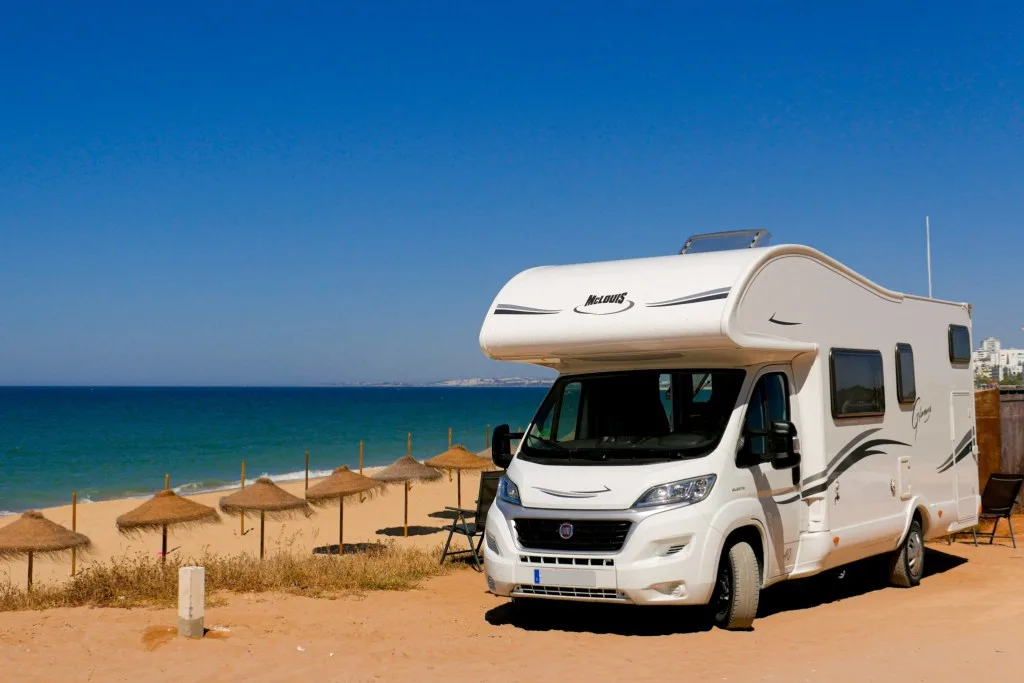
Park on Gravel Spaces
Gravel doesn’t just randomly find itself on the beach. A gravel space is purposeful and indicates a safe place to park without risking water damage. Look for any signs indicating whether camping is prohibited or not.
If the water had reached that location, the gravel would have washed away when the tide receded. When you park in a gravel space, you can relax and enjoy your beach camping experience knowing that your RV and its contents are safe from water.
Pro Tip: Want to try beach camping, but don’t know where to go first? This Map Shows The Best Free Camping in America.
How to Prevent Wind from Ruining Your RV While Beach Camping
Although you can’t see it, the wind can quickly and swiftly blow in and cause damage to your RV. There are a couple of things you can do to protect your RV.
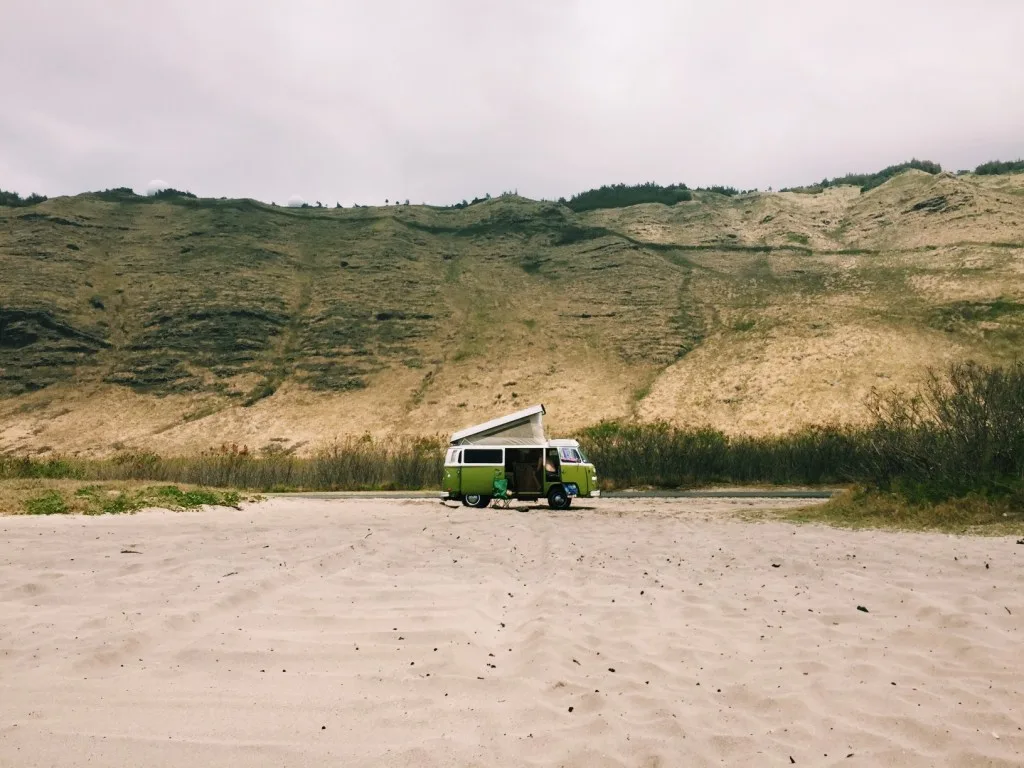
Don’t Keep Your Awning Up
While your awning may provide you a place to retreat from the sun, it will act as a massive sail when the wind picks up. Beaches are often windy locations, so you want to keep your awning in a closed position to avoid a strong gust bending and breaking the supports.
These supports often aren’t very forgiving, and even one strong gust can have you shopping for a new awning. You don’t want to ruin your beach camping trip and future camping trips.
Stake Down Your Belongings
Secure your stuff before your vacation distracts you. Staking down blankets, chairs, and other items is a great way to keep them in place. A strong gust in the right direction can knock over tables and chairs, which not only can cause them to break but also slam into your RV.
Keep things picked up around your site to prevent them from blowing away. If you plan on regularly using items, invest in some quality stakes that can bury in the sand. You can also invest in sandbags or other heavy objects to put on the legs of tables and chairs to keep them in place.
Is RV Beach Camping Worth the Risk or Will It Lead to Ruin?
Beach camping is an incredible way to camp, especially if you love the water. You can have quick and easy access to kayaking, swimming, and fishing. Enjoy some unforgettable sunsets or sunrises. If you take the time to do your research and come prepared, beach camping is most definitely worth the risk.
Whether it’s saltwater or freshwater, beach camping can be a memorable way to camp in your RV. Make sure you come in with a solid plan, and you’ll have a great time. Have you ever beach camped in your RV?
Discover the Best Free Camping Across the USA
To be honest with you, we hate paying for camping. There are so many free campsites in America (with complete privacy).
You should give it a try!
As a matter of fact, these free campsites are yours. Every time you pay federal taxes, you’re contributing to these lands.
Become a FREE CAMPING INSIDER and join the 100,000 campers who love to score the best site!
We’ll send you the 50 Best Free Campsites in the USA (one per state). Access the list by submitting your email below:
Our home base is in Ormond-by-the-Sea, Florida and we are 4 houses and a beach bar from the Atlantic Ocean. Our main problem is salt! Frequent washings and using lubrication spray especially on our electronic steps is essential! Is it worth it? Yes, but it is a hassle and an expense from time-to-time.